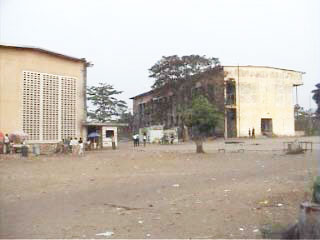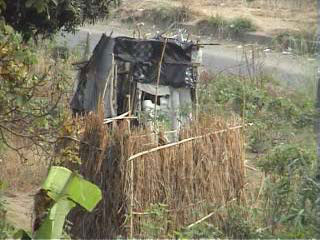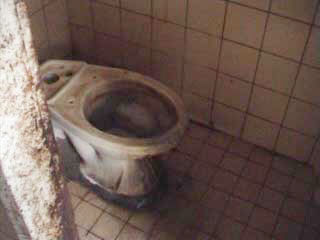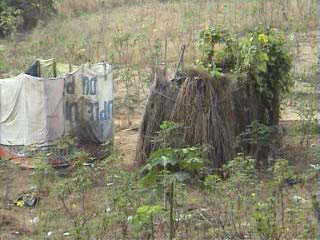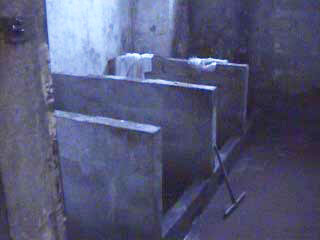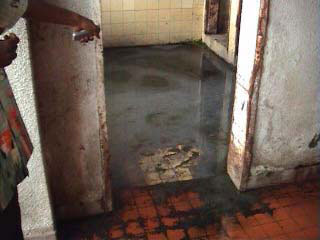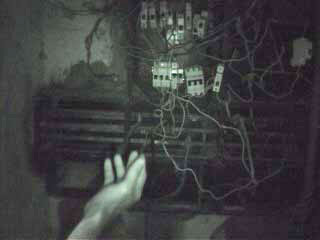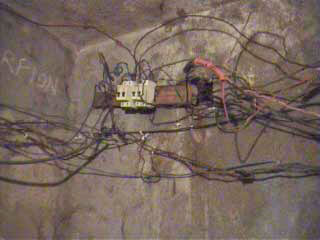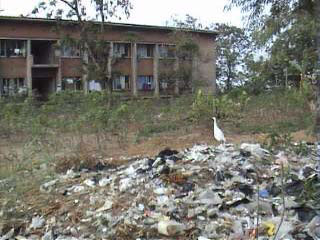Repression in Zimbabwe and the South Africa Connection: 29/05/08
An Interview with Zvisinei C. Sandi
by Russell Berman
Zvisinei C. Sandi is a writer from Zimbabwe, where she was active in the democratic movement. She is currently a Scholar Rescue Fellow at the Freeman Spogli Institute at Stanford University.
Despite extensive efforts to rig the March 29 elections, the ZANU PF proved incapable of providing a victory to Mugabe. So the run-off election, which should have taken place promptly, has been postponed for 90 days—presumably to allow for more intimidation of the population, attacks on the opposition, and corruption of the electoral process. Yet the international press does not report on public responses to this blatant disregard for democratic process. How do you explain the domestic mood? Has the Zimbabwean population been beaten into submission? Or is there some strategy of resistance that is not carried in the press?
No one knows just how much courage it takes to go out everyday and fight against Mugabe, when you've been told that there are comrades' cameras in the ballot boxes and that his henchmen will be watching you. But Zimbabweans have shown that courage, they have gone out into the streets and demonstrated, they have written, they have given press conferences and put up blogs, even if some of their number have been shot down in cold blood, terribly beaten up, or, worse still, arrested, detained, and slowly tortured to death.
What are Zimbabweans expected to do? They have a government that is clinging on to power by sheer force, responding to even the slightest criticism with tremendous violence. The system of oppression covers the whole country. Even in the most remote corners, where only one bus passes each day, Mugabe's henchmen are there. Always ready for a fight, they knock on every door, demanding contributions (in cash) to ZANU PF, and driving everybody out to attend ZANU meetings. Anyone who is smart enough will just hand over the money, and will go to the meeting, for to do otherwise is to sign your own death warrant. These people will kill without even stopping to blink, and they do not care who knows it. They will drag you out of your house, beat you to death, steal your possessions and then burn everything they cannot carry away. If a whole town is at fault, they will bring in a battalion of soldiers, riot police, secret service agents, and youth militia, and in the end Mugabe and his people will prevail. There are places in Zimbabwe's rural areas where the mere sound of heavy vehicles approaching is enough to send people running off into the hills.
The majority of Zimbabwean people are law abiding citizens who have entrusted all of their law enforcement mechanisms into the hands of their government. They have no guns, no militias, nothing. Now that the government is the one that's breaking the law, they have no effective means of resisting. They have done all that they can, and they cannot go any further without outside help. And that help is desperately needed now. One of the basic rules of human etiquette is that, if you see your neighbor's house going up in flames, and you hear screams coming from within, you run there and you break the door down. Unfortunately, Zimbabwe's neighbors seem incredibly deaf.
The world's indifference reminds me poignantly of someone whom for years I have been trying to forget—a teenage girl I once shared a cell with. Time: March 2003. Location: Bindura, a mining town and 90 km north of Harare. There had been massive anti-Mugabe riots in a town that had been believed to be pro-ZANU PF, and Mugabe, in retaliation, sent whole detachments of army, riot police, and intelligence to "clean up the area." The general strategy was to keep these troops out of sight until the main tide of commuters returning from work had subsided (about 7 p.m.) and then let them loose on the town, beating every man, woman, and child found outside of their home. These troops would attack people in the street, the restaurants, nightclubs, driving in their cars, and even those who had outside toilets and had to go during the night.
I was caught out on the second night of this crackdown, and I knew that even though my home was only half a mile away, there was no way I could get there without running into one of these groups. In desperation, I walked into a police station and told them a cock-and-bull story about being a traveler who had missed my only bus to a remote part of the country and now was too scared to spend the night at the bus stop because of thieves (no one mentioned the obvious problem—the troops). The ill-tempered sergeant looked me over, and, deciding that I was harmless, announced that he had no time to waste and if that was what I wanted he would lock me up for the night in a holding cell, and I wasn't arguing. One of my cellmates was a teenage girl who had come to report a rape and aggravated assault by unknown attackers. The police had "considerately" insisted on keeping her until they could find officers to go with her and arrest the perpetrators. In the meantime she stayed in the horrible cell, without medical care, food, or toilet facilities. In the middle of the night our door was pushed open and a group of men came in. They kicked us and demanded to know why each one of us was in the cell. When they heard the girl's story, they simply went berserk. Calling her a cheap MDC [Movement for Democratic Change] tramp, they beat her up and dragged her down the corridor to another cell, out of sight. I'll never know what they did to that child, but I'll never forget her screams. She screamed, and screamed over and over again for hours. She screamed for her mother, for her father, for someone, anyone to come rescue her. But no one came. And for that one child, no one will ever come again. And right there in the middle of the panic and confusion and the pain she must have been feeling, I could imagine what was going on in her child's mind. Her mother must have taught her that if she screamed help would come, right? Most of us believe that, even me, in spite of everything. I could imagine her desperation and her confusion as she realized that no one was going to help her, ever. Now, more than five years later, I share her confusion. Why doesn't someone do something?
What role does the South African political leadership, especially Thabo Mbeki, play with regard to the Mugabe regime? One might have thought that the establishment of democratic norms in post-apartheid South Africa might spill over into Zimbabwe.
Thabo Mbeki has played a large role in Zimbabwe's political crisis, and I am afraid to say that that role had been chiefly negative. If he had (at the very least) kept his hands off the Zimbabwean crisis from the beginning, it is my belief that the country would not have been in as bad a situation as it is now. He has wasted years for the Zimbabwean population, pretending to be working for peace in Zimbabwe, when all he was concerned with was the welfare of Mugabe and his ZANU PF colleagues. Mbeki's policy of "quiet diplomacy" towards Mugabe, seen now in its fading days, seems to be nothing more than a protective cocoon for the dictatorship in Zimbabwe. It allowed Mbeki to absorb all the pressure directed at Mugabe, giving that dictator the space and opportunity to unleash extreme violence against his own people. The last two words that the world heard from Mbeki on the Zimbabwean question (just weeks ago) were that there was in fact no crisis in Zimbabwe and that Mugabe must be given a free hand. Now the world can see the results of Mbeki's advice.
What most people fail to appreciate is that there is a very close link between Mbeki and the ANC on the one hand and Mugabe and his ZANU PF on the other. They stood side by side, as they fought for independence in their respective countries. After 1980, the ANC and its leaders, among them Thabo Mbeki, had to continue the anti-apartheid struggle for 14 long years after Zimbabwe regained its own independence, relying heavily on the support of the young nation for its struggle. Zimbabwe openly opposed the apartheid government to such an extent that the apartheid regime felt that it had to undertake a destabilization campaign against Zimbabwe, if only to discourage it from assisting the ANC. It is impossible to imagine that apartheid agents were busy planting bombs in Zimbabwe, without Mugabe's Central Intelligence Organization (CIO) also being actively involved in South Africa. As a result, Mbeki and Mugabe share a strong bond. They have been through a lot together, having stood shoulder to shoulder through decades of bloody conflict. Mbeki feels a strong loyalty, alas, not to the Zimbabwean people, but to Mugabe, his ZANU PF government, and the bloodthirsty War Veterans militia that has so ravaged the country. Like Mugabe, Mbeki cannot understand the so-called "Born-Frees," the people whose voices have come up after independence, calling for more democratic rights and economic development. According to the reasoning of these veterans, why should these young people want to take power from the people who worked so hard to bring the independence in the first place?
In addition to these feelings of loyalty, Mbeki might have an extra reason for his "quiet diplomacy." The reports coming up suggest that Mbeki dirtied his hands rather badly in the anti-apartheid fight. One apparently credible report ties Mbeki to the 1994 assassination of the popular ANC leader Chris Hani, who was at the time the most likely candidate to succeed Nelson Mandela in the South African presidency. If this is true, which I personally believe it is, it is unlikely that Mugabe's CIO would have missed collecting the evidence of such a juicy piece of news and even less likely that it would hesitate to use it in now as leverage against arguably the most powerful figure in contemporary African politics. The CIO has passed muster when it comes to blackmail and threats.
Aside from the political leadership in South Africa, do prominent public figures like Desmond Tutu play a role in condemning the Mugabe dictatorship? What about the influence of other African leaders?
Prominent public figures in South Africa have been largely silent on the question of the Zimbabwean crisis. Partly because of Thabo Mbeki's role as the official arbitrator in Zimbabwe and because of South Africa's chairmanship of the United Nations Security Council, the Zimbabwean problems has been seen chiefly as a problem for politicians to solve. To compound matters, Mbeki has chosen, in order to protect Mugabe, and to centralize power into his own hands, to stay personally in charge of the Zimbabwean situation.
Although he has never been particularly fond of Mugabe, one prominent person who has been surprisingly silent is the former South African president, Nelson Mandela. One would have expected that with his record, and with what he has personally suffered under an unjust regime, he would have spoken out against what is happening in Zimbabwe. His silence is especially baffling. A possible explanation for this is the anti-colonial record that made Mugabe one of the greatest heroes of the 20th century. Given everything he did for African independence, attacking him would probably seem to Nelson Mandela to entail attacking everything that he himself has stood for during the last half century, a feeling shared by many Africans who have not witnessed Mugabe's human rights atrocities firsthand.
Unlike Thabo Mbeki, Desmond Tutu has not been silent. He has consistently called for international intervention to solve the crisis in Zimbabwe, but for some reason, he is one of the voices that in this case the world has chosen to ignore. I wonder why.
As for other African leaders, until recently, there has been a level of solidarity with Mugabe that has left the rest of the world perplexed. We have already discussed the main cause of cause of this—the Mbeki factor. Hiding behind his policy of "quiet diplomacy," Mbeki has stood firmly beside Mugabe, arguing that Mugabe needed to be handled carefully handled since he would not respond to hostile pressure. That has put the two most powerful countries in Southern Africa—South Africa and Zimbabwe—on the same side, and it would have therefore been unwise for the weaker countries in this region to show hostility to Mugabe's policies; this would have only exposed them both militarily and in terms of international politics.
The other factor to be considered in this question is economic expediency. It's all very well to try and heal Zimbabwe's shocking political wound, but until recently, all the trouble in Zimbabwe has actually benefited its neighbors. The white commercial farmers who lost everything in Zimbabwe and have largely been driven out of the country, have been welcomed with open arms in Zambia and Mozambique, where they have brought more than a century of farming experience. Now Zimbabwe, the region's former bread basket, is trying to raise the foreign currency to buy some of the food that the farmers it kicked out are currently producing just across the border. Zambia, which until 2001 had relied on food imports, is now racking in a lot of foreign currency from food exports. The same goes for tourism: once the region's most popular tourist destination, Zimbabwe is now a pariah nation, as tourists now prefer to go to either South Africa or Zambia. The major transnational corporations that once had their headquarters in Harare have long since moved to South Africa and any new investments targeted at the area will certainly not go to Zimbabwe, but to one of its more peaceful neighbors. So for Zimbabwe's closest neighbors, the soft policy on Mugabe has paid off well.
The international press has begun to report on outbreaks of anti-foreigner violence in South Africa, which frequently targets Zimbabweans. Do you see some connection between such violence and the larger political issues at stake between Zimbabwe and South Africa?
On the surface, the anti-Zimbabwe violence in South Africa seems easy to understand. For one thing, South Africa is a high crime country, and much of the crime is violent. People often kill each other over trivial arguments, and violent, often fatal robberies are for sums as small as 100R (about 16 US dollars). Much of the violence is a carry-over from the apartheid era, when almost everything was criminalized, and it was virtually impossible to follow the law. Almost a decade and a half of the new ANC government have done nothing to change the situation. African communities are still desperately poor, the crime rate is still high and escalating, and the standards of education remain low. Into this situation you pour in millions of Zimbabweans who are fleeing the violence and the economic meltdown in their own country, and you have serious problems. The average Zimbabwean is far more educated and far more prepared to work than the average South African (under apartheid, African schools could not teach science, mathematics, or English, and the Mbeki government has been hard-pressed to remedy the situation), which means that Zimbabweans get most of the jobs that are up for grabs. To make matters worse, they are likely to have much more money to start with (the South African government demands, among other things, to see 2000R up front before a visa can be granted to a Zimbabwe national). In addition, most Zimbabweans coming into South Africa are not expecting to stay forever; they want to save as much money as possible and send it home, which means that they tend to stick to the cheapest possible accommodation, in the shacks— among the poorest of the poor, who have no jobs, no education, and, as things stand now, no hope of bettering their situation. It is easy to see how tension can build up and explode into violence.
This, as I said, is how things appear on the surface, until one looks more closely at the situation and sees a more sinister pattern at work. The real culprits in the abuse of Zimbabwe nationals are the authorities themselves, namely the Zimbabwean and the South African governments. First of all, in recent years, the Mugabe government has almost stopped issuing travel documents at a time when the economic crisis and the political situation have made most of the population desperate to travel, causing queues to form outside the Registrar General's office in every town. People have been known to sleep outside these offices for weeks at a time, hoping against hope that they would one day be among the few whose names are called out. In the end, most of these people give up trying to get any travel document and simply walk across the border without documentation. The only place they can go this way, without travel documents and with no clear idea of where and no plan of what to do once they get there, is down to South Africa. Such travel involves crossing the Limpopo River (a dangerous venture, which, if the river is in flood, often results in drownings and crocodile attacks), somehow making their way past the border fence, made of sharp razor wire, and then walking through miles of forest, infested with wild animals and desperate criminals that prey upon the equally desperate population, until they finally reach the relative safety of Mussina, the South African border town.
I personally took that route when I left Zimbabwe for the last time, and I can tell you that it's not an easy stretch. I had to hire a smuggler to guide me through (he dealt in anything, cooking oil, clothing, people, potato chips—you name it) and most of the time that I was with him I had no idea where he would lead me, whether through to safety or to rob me. I was so brutalized at the time that had he chosen to do so, I doubt that I could have remembered his face, and even if I had, where would I file my case? But the basic decency of the Shona people won through: he took me across, stopping regularly to let me rest because my body hurt, and even loaning me his big jacket because it was so cold. Once in Mussina, he even helped to me to arrange the next part of my journey.
For most border jumpers, the next stage of the journey (and the lawful one) is to get to the offices of the South African Home Affairs and apply for asylum or at least some form of refugee documentation. Easier said than done. From the days or even weeks of sitting hopelessly outside the Registrar General's office in Zimbabwe, they go through the whole desperate process, just to find themselves continuing to wait around in South Africa. Outside the South African Home Affairs office at Marabastad in Pretoria, the refugees are told to queue by country, and then the Zimbabwean line is simply ignored. One woman I spoke to in June last year (she had a six-month-old baby in her arms) told me that she had been living outside the Marabastad offices for two months. For these refugees, there are no toilet facilities, no food, no clean water, and no personal safety. Leaving the compound to buy food across the street might mean a gruesome arrest and deportation process. According to a report by the Zimbabwe Exiles Forum, the Zimbabwean refugees at Marabastad have been exposed to assault, rape, and frequent robberies, while desperately waiting for someone to attend to them.
The sorry crowd at Marabastad is so reminiscent of the crowds outside the Registrar General's offices in Zimbabwe that it suggests an ominous coordination of policy between the Zimbabwean government and its South African counterpart. One is never sure what to think.
The South African government has consistently refused to acknowledge that there is a humanitarian crisis in Zimbabwe, and in order to protect its position, it has refused to do anything about the thousands of Zimbabwean refugees daily flowing through its borders. Instead, there has been a systematic policy to frustrate and abuse the Zimbabwean refugees so that they think twice before coming into South Africa. There is a determined effort to detect Zimbabwe immigrants, arrest and deport them. In many cases, according to the Zimbabwe Exiles Forum, police demand papers from legal Zimbabwean immigrants, and then proceed to destroy them and then arrest the immigrants concerned, ostensibly for not having papers. Once arrested, the repatriation process is brutal, often including beatings upon arrest, followed by long periods of detention without any guidelines as to the time frame of the repatriation process. The daily manhunt directed at Zimbabweans has become a major occupation for the South African law enforcement agencies, and this kind of official hostility towards what has become a significant part of the South African population tends to filter easily to the generality of the population: "if the police are always chasing after them, then there must be something awfully wrong with them. Besides, they do take all the good jobs!" If the South African government and the international community treated those people as what they are—refugees in need of help—then maybe the majority of the South African people would follow suit.
One question, ridiculous as it might seem, has to do with the authenticity of these riots. Exactly who starts them? Who utters the first battle cry? Who casts the first stone? Experience has made me a doubter. Mugabe's secret intelligence organization, the CIO, is all pervasive in Zimbabwe, to such an extent that no one knows how large it is. Its agents turn up among the bus conductors, street vendors, at university campuses, at schools, among the homeless population and in the endless queues, and they are fantastic at organizing and infiltrating demonstrations, a favorite technique, when they want to eliminate a certain member of the opposition or civil society.
Now, if ordinary housewives can jump the border into South Africa, what is there to stop these hardened thugs from doing the same? There have been rumors of them doing so, and more sinister still, of them kidnapping certain refugees and jumping them back across the border into Zimbabwe. One of the CIO's major accomplishments is its ability to make people "disappear," and I shudder to imagine the harm they can do if they penetrated the semi-legal world of Zimbabwean refugees in South Africa. It's a place full of undocumented people, many of whom Mugabe would be glad to be rid off for good. Many Zimbabwean activists in South Africa live in terror, constantly turning their heads as they move around and will not go into crowded places, and they have chilling stories to tell.
Gabriel Shumba, an exiled Zimbabwean lawyer who heads the Zimbabwe Exiles Forum, tells of threats he received at the African Union Summit in Accra, Ghana in June of last year, when he went to present the case of more than a dozen victims of the violence in Zimbabwe. One CIO boss openly told him not to feel too safe just because he now lived in South Africa. "He told me that they knew where I lived and if they wanted me badly enough, they could arrange for me to wake up in a Zimbabwean jail, and this time they would finish the job (Shumba has been tortured in Zimbabwe). I think he meant it."
If one looks back to 2000, the bloody land seizures started as a "civil demonstrations." The only indication that the government was involved was that the police refused to step in and stop it, arguing that they were not equipped to put down put down riots of such a magnitude. At the time, we heard almost exactly the same xenophobic claims we are hearing in the South Africa disturbances. Even in academic circles, white-baiting showed its ugly head. There was a lot of confusion until the government finally came out into the open and admitted that it had been responsible from the beginning. Then the really bloody times began and no one was safe—White, Black, Ndebele, Shona, or Venda. That is how the CIO operates.
Most people I have talked to in South Africa say that there is little evidence that the CIO is involved and maybe they are right, but I have been around the block and I am still suspicious. I have simply seen too much.
--
Jean-Louis Kayitenkore
Procurement Consultant
Gsm: +250-08470205
Home: +250-55104140
P.O. Box 3867
Kigali-Rwanda
East Africa
Blog:
http://www.cepgl.blogspot.comSkype ID : Kayisa66


